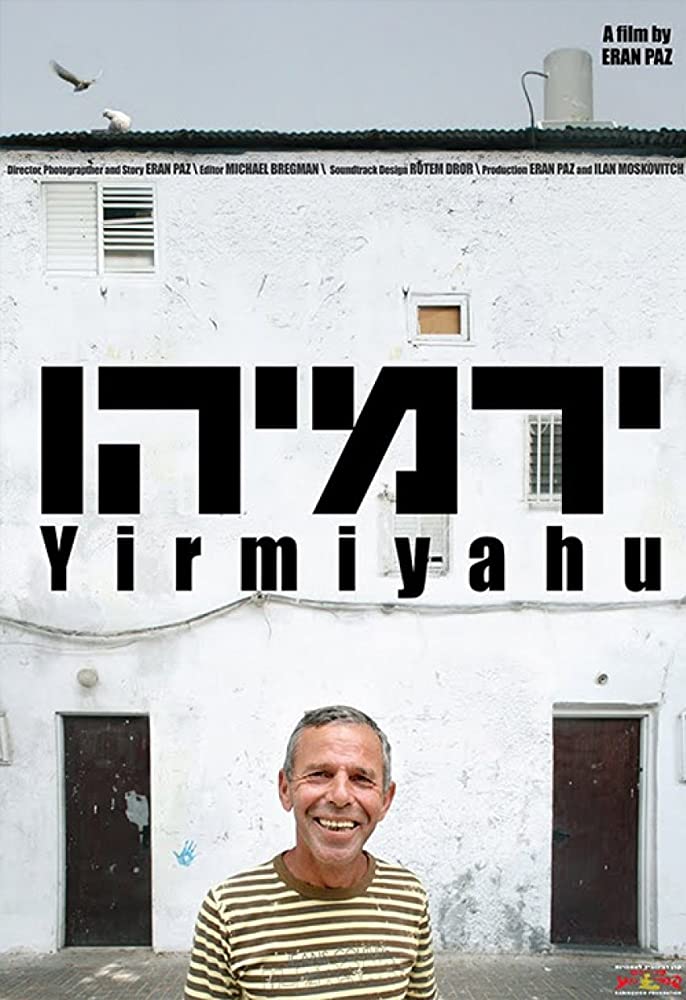YIRMIYAHU
Israeli filmmaker Eran Paz depicts the life of several residents of Shapira, a downbeat district in the south of Tel Aviv. The population – a mixture of immigrants from the former Soviet Union, refugees and jobless, junkies and prostitutes – live in substandard, often provisional, housing. Jeremiah, aka Yura, is a local who sounds as rough and ready as his surroundings, but his heart is in the right place. His family and neighbours depend on him to be there when needed, and he’s the one who takes frail old Zalman out for walks, treats his friends to guitar renditions of passionate Russian songs, and keeps a watchful eye on their alcohol intake. Yura’s door is open to everyone, including his cousin Zhora, a drug addict who hardly talks any more. Caring and resolute, Yura makes sure things stay on more or less on track and nobody disappears without trace. Doing without commentary or interviews, but staying close to the protagonists all the same, the documentary describes the district and its everyday life: the haggling over second-hand TV sets, the binges on cheap red wine. But things are about to change: Yura plans to move to a different city along with his wife Tanya and their children.
Israeli filmmaker Eran Paz depicts the life of several residents of Shapira, a downbeat district in the south of Tel Aviv. The population – a mixture of immigrants from the former Soviet Union, refugees and jobless, junkies and prostitutes – live in substandard, often provisional, housing. Jeremiah, aka Yura, is a local who sounds as rough and ready as his surroundings, but his heart is in the right place. His family and neighbours depend on him to be there when needed, and he’s the one who takes frail old Zalman out for walks, treats his friends to guitar renditions of passionate Russian songs, and keeps a watchful eye on their alcohol intake. Yura’s door is open to everyone, including his cousin Zhora, a drug addict who hardly talks any more. Caring and resolute, Yura makes sure things stay on more or less on track and nobody disappears without trace. Doing without commentary or interviews, but staying close to the protagonists all the same, the documentary describes the district and its everyday life: the haggling over second-hand TV sets, the binges on cheap red wine. But things are about to change: Yura plans to move to a different city along with his wife Tanya and their children.
A piece of stretched cloth and a few planks of plywood which Yermiyahu put together to enlarge his one-room apartment, is all that separates his family’s home from the bustling streets that surround his house in the Shapira neighborhood in southern Tel Aviv. The streets here are filled with all types of people: immigrants, foreign workers, Sudanese refugees and Palestinian cooperatives. Amongst them are quit a few junkies, prostitutes and alcoholics; a completely different image then the one you get when you hear the words:” Tel Aviv”. Yermiyahu, his wife and two children are not the only ones living in their home. In one if the rooms lives Velra, who as a result of his handicap and drinking, is relived that Yermiyahu takes care of him and gives him a room to sleep in. In the storage room lives Gora, Yermiyahu’s cousin, who’s a burden on the family due to his drug habit. Misha, a former boxer, is asking to join the others, and is willing to sleep in the yard. Of course, Yermiyahu accepts him without thinking twice. In honor of the new “recruit” Misha makes and effort to stop drinking. Yermiyahu is about to leave, his wife Tanya is fed up with this scary neighborhood. Misha is not shy about his great desire to move with them to Be’er Sheva. He quits drinking, cleans, cooks, and does everything in his power to be liked by Yermiyahu and his family. Yermiyahu, the neighborhood’s “sheriff”, collects his belongings and his family and moves. The Shapira neighborhood seems the same, only it is missing one of its residents, and as a result several people must return to loneliness.

